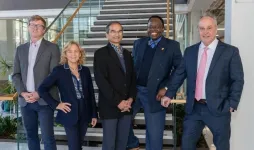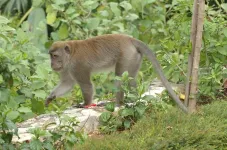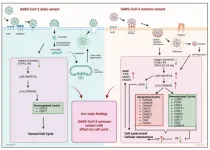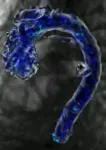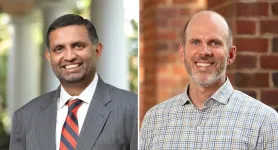(Press-News.org) The National Science Foundation has awarded Lehigh University $6 million to increase the translation of scientific discoveries by faculty, graduate students and postdoctoral researchers into prototypes, products and programs that will benefit society.
The NSF’s Directorate for Technology Innovation and Partnerships (founded in 2022) provided the four-year award to an interdisciplinary, university-wide team led by John Coulter, senior associate dean for research in the P.C. Rossin College of Engineering and Applied Science, as part of the new federal Accelerating Research Translation (ART) program.
The award will support Lehigh’s work to speed up and support its research activities in engineering, science, health, humanities, business, education and myriad other areas that have the potential to lead to products and services for the general good. Lehigh also will train graduate students and postdoctoral researchers in translational research.
“While it’s essential to make discoveries and do fundamental research, as a university we must also be effective in translating new knowledge to solve important problems in the world. This is how we enhance the impact of the research done by our faculty, staff and students,” said Lehigh Provost Nathan Urban. “We are excited that NSF has recognized and decided to support Lehigh’s efforts to take ideas and discoveries from the lab and develop them into practical solutions to societal and economic challenges.”
A portion of the funding will support seed translational research projects that are on the “cusp” of being applied to practical outcomes, and the rest will support education and training as well as other research translation enhancement activities.
“This is a high-priority initiative,” Coulter said. “Lehigh will create and operate a comprehensive, inclusive and accessible research translation ecosystem that will guide researchers and project teams along the paths of venture creation, research translation into existing industry, and societal impact."
The investments are not just important to Lehigh, but to funding agencies as well, Coulter said. “This is a national and international trend to have research be more use-inspired, more connected to the end users … and more rapidly translated for positive societal impact. That's what this is meant to do.”
Carnegie Mellon University will serve as a peer mentor institution, helping Lehigh leverage its existing strengths to grow its translational research work and transform its culture.
The first-ever awards address a long-standing gap between academic research and practical solutions for society’s complex problems.
“On the faculty side, we all say we want impact,” said Dominic Packer, associate vice provost for research at Lehigh and a member of the ART leadership team. “Some of the greatest impact is when you discover something new and it actually creates something that changes how doctors deliver medicine, or is a new invention that people put to use out in the field, or is an intervention for kids in schools.”
But translating that research into usable products or services can be challenging, he said.
“Every university has this problem. It's sometimes called the Valley of Death between work that happens on a campus and then actually gets into the world.” he said. “It's in part because, as researchers, we don't have those skill sets. We're not business people. We've never thought entrepreneurially for the most part. …This is a program to really help elevate that.”
The NSF award advances the goals outlined in Lehigh’s strategic plan, Inspiring the Future Makers. The 10-year plan outlines a bold vision for the university centered around breaking boundaries to address societal challenges, innovate in academics and research, and cultivate collaborations and partnerships to amplify Lehigh’s global, national and regional impact. The plan aims to allow Lehigh to find pragmatic solutions to the world’s problems through research and scholarship.
The work will build on Lehigh’s strengths and past successes, such as the innovative Pasteur Partners PhD (P3) Fellowship, a launchpad for advanced students who are focused on creating immediate impact in their fields through use-driven research.
In all, 18 academic institutions across the nation were awarded the ART funding, which totaled more than $100 million.
“NSF endeavors to empower academic institutions to build the pathways and structures needed to speed and scale their research into products and services that benefit the nation," said NSF Director Sethuraman Panchanathan. "The Accelerating Research Translation program in NSF’s new Technology, Innovation and Partnerships Directorate identifies, and champions institutions positioned to expand their research translation capacity by investing in activities essential to move results to practice."
In its proposal, Lehigh indicated that the funding could prove transformational, especially for Ph.D. education as the university implements its strategic plan and helps students with practical questions: How do you make a business plan? How do you talk to potential investors? How do you ideate and take things from one’s intellectual world into the real world?
“Lehigh, despite the great research we do, does not have a great track record of startup companies, of patents, of that kind of translational work,” Packer said. “So we really think this is a chance for us to elevate that and start us, in some ways, on a new pathway. … We're aiming to double research activity. We aim to more than double—maybe triple or quadruple— translational work, because we have so much room to grow.”
Kate Bullard, director of research development at Lehigh, said each institution that received funding will have ambassadors who will regularly gather in Washington, D.C., to share experiences and lessons learned.
“It's not just the work that's going to happen here,” Bullard said. “But we're going to be part of a national conversation around research translation, and I think that's massively important.”
The Lehigh team intends to build an inclusive capacity and infrastructure for research translation, provide accessible education and training, and drive a culture change toward research translation throughout the university community.
To help accomplish these goals, Lehigh will develop one-credit course modules with incentives for participation, a fellows program and a summer research translation bootcamp. Lehigh also plans to add personnel, expand its existing undergraduate and graduate programming in research translation, and mentor students through career options and offerings.
Research translation will be emphasized at all orientation sessions for new faculty, graduate students and postdocs and research scientists.
Additionally, Lehigh aims to grow its involvement with Ben Franklin Technology Partners, which provides funding, business and technical expertise and other resources to early-stage and established companies to help with growth. It also hopes to utilize a Lehigh Research Translation External Advisory Council, and form external partner networks, such as a New Ventures Executives Network to lead new startups and an Entrepreneurs-in-Residence program.
“We’re at a moment of big, big challenges [in society], and the federal agencies can't fund enough to solve them,” Bullard said. “The federal government can't do everything. So how do we form partnerships that solve these big problems? It's training graduate students and postdocs to tackle these problems.”
The ART Leadership Team at Lehigh
In addition to Coulter as principal investigator (PI) and Packer as co-PI, other co-PIs are:
—Lee Kern, professor of special education and director of the Center for Promoting Research to Practice at Lehigh
—Henry Odi, deputy vice president for equity and community and associate provost for academic diversity
—Himanshu Jain, the T.L. Diamond Distinguished Chair in engineering and applied science, professor of materials science and engineering, and director of the Institute for Functional Materials and Devices (I-FMD) at Lehigh.
Three faculty members will lead primary research-translation ecosystem components:
—Mike Lehman, director of Lehigh’s technical entrepreneurship program, professor of practice.
—Neal Simon, professor of biological sciences
—Hannah Dailey '02 '06G '09 Ph.D., associate professor of mechanical engineering and mechanics
Additional members of the Lehigh senior personnel team are:
— Anand Jagota, vice provost for research and founding chair of the bioengineering program
—Lesley Chow, associate professor, bioengineering, materials science and engineering
—Andreea Kiss, the Ferdinand Thun ‘56 Chair in Family Business
—Rick Smith, director of technology transfer
—Kevin Major, research engagement officer, I-FMD
—Lisa Getzler, vice provost for entrepreneurship
—Won Choi, epidemiologist; professor, Department of Community and Population Health in the College of Health; associate dean, research and graduate studies.
—Minyi Dennis, associate professor of special education
END
NSF awards $6M to Lehigh University to speed up translation of research into real-world application
The new Accelerating Research Translation (ART) program addresses the gap between academic research and practical solutions for society’s complex problems.
2023-12-15
ELSE PRESS RELEASES FROM THIS DATE:
NSF-funded project provides digital maps to improve accessibility and navigation for persons with disabilities
2023-12-15
Vinod Namboodiri, joint faculty member of Lehigh University’s College of Health and P.C. Rossin College of Engineering and Applied Science, has been awarded Phase 2 funding from the National Science Foundation’s (NSF) Convergence Accelerator to further develop a digital app to help persons with disabilities navigate indoor environments successfully.
MABLE: Mapping for Accessibility in BuiLt Environments provides persons with disabilities independence to experience large events, conferences and educational programs. Using crowdsensing, AI and robotics, MABLE empowers individuals with responsive ...
Study identifies Florida’s potential invasive species threats
2023-12-15
In a first-of-its-kind study for North America, scientists accumulated a list of potential invasive species for Florida, and researchers deemed 40 pose the greatest threat.
A team of experts, led by University of Florida scientists, evaluated terrestrial, aquatic and marine species with characteristics that make them particularly adept at invasion. Their list includes 460 vertebrates, invertebrates, algae and plants.
“Invasive species management tends to be reactive, instead of preventative,” said Deah Lieurance, ...
Researchers use environmental justice questions to reveal geographic biases in ChatGPT
2023-12-15
Virginia Tech researchers have discovered limitations in ChatGPT’s capacity to provide location-specific information about environmental justice issues. Their findings, published in the journal Telematics and Informatics, suggest the potential for geographic biases existing in current generative artificial intelligence (AI) models.
ChatGPT is a large-language model developed by OpenAI Inc., an artificial intelligence research organization. ChatGPT is designed to understand questions and generate text responses based on requests from users. The technology has a wide range of applications from content creation and information gathering to data analysis and language translation.
A ...
Using a fiber optic cable to study Arctic seafloor permafrost
2023-12-15
ALBUQUERQUE, N.M. — The Arctic is remote, with often harsh conditions, and its climate is changing rapidly — warming four times faster than the rest of the Earth. This makes studying the Arctic climate both challenging and vital for understanding global climate change.
Scientists at Sandia National Laboratories are using an existing fiber optic cable off Oliktok Point on the North Slope of Alaska to study the conditions of the Arctic seafloor up to 20 miles from shore. Christian Stanciu, project lead, will present their latest findings on Friday, Dec. 15 at AGU’s Fall ...
A unique pathogenic mechanism of SARS-CoV-2 omicron variant: Selective induction of cellular senescence
2023-12-15
“Our findings suggest that the omicron variant, in particular, leads to premature senescence in in vitro, ex vivo, and in lung tissue models.”
BUFFALO, NY- December 15, 2023 – A new research paper was published on the cover of Aging (listed by MEDLINE/PubMed as "Aging (Albany NY)" and "Aging-US" by Web of Science) Volume 15, Issue 23, entitled, “Uncovering a unique pathogenic mechanism of SARS-CoV-2 omicron variant: selective induction of cellular senescence.”
SARS-CoV-2 variants are constantly emerging with a variety of changes in the conformation of the spike ...
UChicago Medicine among the first in the country to offer newly approved sickle cell gene therapies
2023-12-15
The University of Chicago Medicine Comer Children’s Hospital will be among the first in the country to offer gene therapy for sickle cell disease in patients 12 years and older, after federal regulators approved two new treatments on December 8, 2023.
Thousands of patients with sickle cell disease experience vaso-occlusive crises (VOCs), which are often painful and frequently require hospitalization. The two new potentially curative treatments show promise for eliminating VOCs and offer an alternative to bone marrow transplants, which can be arduous and carry risk of rejection even if a matching donor is found.
People ...
Unstable ‘fluttering’ predicts aortic aneurysm
2023-12-15
Northwestern University researchers have developed the first physics-based metric to predict whether or not a person might someday suffer an aortic aneurysm, a deadly condition that often causes no symptoms until it ruptures.
In the new study, the researchers forecasted abnormal aortic growth by measuring subtle “fluttering” in a patient’s blood vessel. As blood flows through the aorta, it can cause the vessel wall to flutter, similar to how a banner ripples in the breeze. While stable flow predicts normal, natural growth, unstable flutter is highly predictive of future abnormal growth and potential rupture, the researchers found.
Called ...
Microbiome insights found in poop help predict infections in liver transplant patients
2023-12-15
In a new study, researchers at the University of Chicago were able to predict postoperative infections in liver transplant patients by analyzing molecules in their poop. Their analysis represents a key leap forward in exploring the connection between the gut microbiome — the bacteria that inhabit the human body — and overall health.
“Antibiotic resistance is growing every year and getting worse. Without antibiotics that work, we can't do things like perform surgeries, protect premature infants or treat cancer,” said Christopher Lehmann, MD, ...
A new tool to better model future wildfire impacts in the United States
2023-12-15
SAN FRANCISCO – Wildfire management systems outfitted with remote sensing technology could improve first responders’ ability to predict and respond to the spread of deadly forest fires.
To do this, researchers at The Ohio State University are testing the use of Synthetic Aperture Radar, or SAR, to help with wildfire detection.
For many ecosystems, fires are vital tools that help to clear away plant waste, provide safer habitats for smaller species and burn off disease. Yet as Earth continues to experience warmer, drier conditions, the likelihood and severity of large, uncontrolled fire incidents that result in widespread ...
Navigating climate challenges: UVA engineers and environmental scientists aid Virginia’s eastern shore
2023-12-15
Because of warming waters and melting glaciers, the sea level at Virginia’s Eastern Shore has risen almost 3 inches since 2016, and the projected trajectory looks ominous. The region, sandwiched between the Chesapeake Bay and the Atlantic Ocean, has one of the highest rates of relative sea-level rise on the Atlantic coast. The Virginia Institute of Marine Science’s Center for Coastal Resource Management projects a relative sea-level rise between 4.5 to 7 feet by 2100, which is three to four times the global average.
Hampton, Virginia — its neighbor across the bay — ranks second only to New Orleans as the largest population center ...
LAST 30 PRESS RELEASES:
Pathway to residency program helps kids and the pediatrician shortage
How the color of a theater affects sound perception
Ensuring smartphones have not been tampered with
Overdiagnosis of papillary thyroid cancer
Association of dual eligibility and medicare type with quality of postacute care after stroke
Shine a light, build a crystal
AI-powered platform accelerates discovery of new mRNA delivery materials
Quantum effect could power the next generation of battery-free devices
New research finds heart health benefits in combining mango and avocado daily
New research finds peanut butter consumption builds muscle power in older adults
Study identifies aging-associated mitochondrial circular RNAs
The brain’s primitive ‘fear center’ is actually a sophisticated mediator
Brain Healthy Campus Collaborative announces winner of first-ever Brain Health Prize
Tokyo Bay’s night lights reveal hidden boundaries between species
As worms and jellyfish wriggle, new AI tools track their neurons
ATG14 identified as a central guardian against liver injury and fibrosis
Research identifies blind spots in AI medical triage
$9M for exploring the fundamental limits of entangled quantum sensor networks
Study shows marine plastic pollution alters octopus predator-prey encounters
Night lights can structure ecosystems
A parasitic origin for the ribosome?
A gold-standard survey of the American mood
Tool for identifying children at risk of speech disorders
How Japanese medical trainees view artificial intelligence in medicine
MambaAlign fusion framework for detecting defects missed by inspection systems
Children born with upper limb difference show the incredible adaptability of the young brain
How bacteria can reclaim lost energy, nutrients, and clean water from wastewater
Fast-paced lives demand faster vision: ecology shapes how “quickly” animals see time
Global warming and heat stress risk close in on the Tour de France
New technology reveals hidden DNA scaffolding built before life ‘switches on’
[Press-News.org] NSF awards $6M to Lehigh University to speed up translation of research into real-world applicationThe new Accelerating Research Translation (ART) program addresses the gap between academic research and practical solutions for society’s complex problems.
